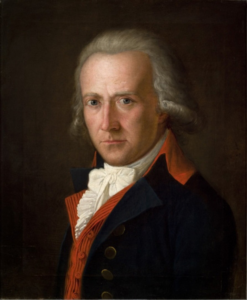Voice of love
(Poet's title: Stimme der Liebe)
Set by Schubert:
D 187
[May 1815]
D 418
[April 29, 1816]
Abendgewölke schweben hell
Am bepurpurten Himmel;
Hesperus schaut mit Liebesblick
Durch den blühenden Lindenhain,
Und sein prophetisches Trauerlied
Zirpt im Kraute das Heimchen!
Freuden der Liebe harren dein!
Flüstern leise die Winde;
Freuden der Liebe harren dein!
Tönt die Kehle der Nachtigall;
Hoch von dem Sternengewölb herab
Hallt mir die Stimme der Liebe!
Aus der Platanen Labyrinth
Wandelt Laura, die Holde!
Blumen entsprießen dem Zephyrtritt,
Und wie Sphärengesangeston
Bebt von den Rosen der Lippe mir
Süße Stimme der Liebe!
Evening clouds are floating brightly
In the crimsoned sky.
Hesperus is peering with a loving look
Through the blossoming grove of lime trees,
And the prophetic mourning song of
The cricket is being chirped in the undergrowth!
The joys of love are waiting for you!
The winds are whispering softly;
The joys of love are waiting for you!
The throat of the nightingale is ringing out;
High up in the vault of the stars
The voice of love is echoing to me!
Out of the labyrinth of plane trees
Laura, the beautiful one, is emerging!
Flowers spring up in the footsteps of the zephyrs,
And like the notes of the music of the spheres
Trembling lips call out from the roses with
The sweet voice of love!
All translations into English that appear on this website, unless otherwise stated, are by Malcolm Wren. You are free to use them on condition that you acknowledge Malcolm Wren as the translator and schubertsong.uk as the source. Unless otherwise stated, the comments and essays that appear after the texts and translations are by Malcolm Wren and are © Copyright.
☙
Themes and images in this text:
Clouds Crickets Echo Evening and the setting sun Flowers Flying, soaring and gliding Gazes, glimpses and glances Grass Hesperus, the evening star (Venus) Joy Labyrinths Laments, elegies and mourning Lime trees (Lindenbaum) Lips Music of the spheres Nightingales, Philomel Red and purple Roses and pink Stars Sweetness Trees (general) Voices Walking and wandering Wind Woods – groves and clumps of trees (Hain)
The sights and sounds of the evening are full of anticipation and promise. As the sky changes colour and the evening star seems to peer through the gaps in the linden blossom the chirrupping cricket can be heard: its song is both a lament (presumably for the day that is dying) and a ‘prophecy’. It is telling the poet that the joys of love are on the way. The message is repeated in the whispering of the wind and the singing of the nightingale.
All of this was setting the scene. Laura now emerges (though oddly out of a maze of plane trees rather than the lime grove where the poet was waiting a moment ago). Where she treads (light as a zephyr) flowers seem to spring up and the voice of love itself seems to emerge from the roses. Since it is dark by this point, the flowers must be recognised by smell, adding another (and perhaps more immediate) sensation (after sight and sound) to the atmosphere of anticipation. Only taste and touch (‘the joys of love’) are yet to be experienced.
☙
Original Spelling Stimme der Liebe Abendgewölke schweben hell Am bepurpurten Himmel; Hesperus schaut mit Liebesblick Durch den blühenden Lindenhain, Und sein prophetisches Trauerlied Zirpt im Kraute das Heimchen! Freuden der Liebe harren dein! Flüstern leise die Winde; Freuden der Liebe harren dein! Tönt die Kehle der Nachtigall; Hoch von dem Sternengewölb' herab Hallt mir die Stimme der Liebe! Aus der Platanen Labyrinth Wandelt Laura, die Holde! Blumen entsprießen dem Zephyrtritt, Und wie Sphärengesangeston Bebt von den Rosen der Lippe mir Süße Stimme der Liebe!
Confirmed by Peter Rastl with Schubert’s probable source, Gedichte von Friedrich von Matthisson. Erster Theil. Tübingen, bei Cotta, 1811, page 17; and with Friedrich von Matthisson, Gedichte, Zurich, Füssli, 1851, pages 21-22.
To see an early edition of the text, go to page 160 [164 von 192] here: http://digital.onb.ac.at/OnbViewer/viewer.faces?doc=ABO_%2BZ170963109


